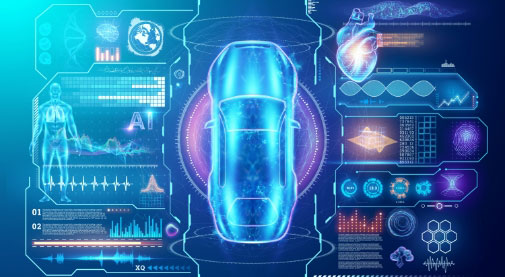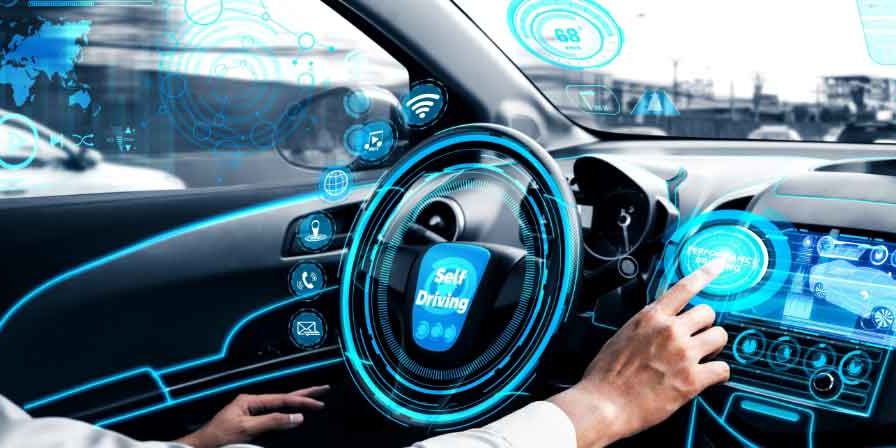Gearing up with the AI Edge
The Automotive Industry has always been up and straight to inculcate in the vehicles, the aspects like performance, innovation, and safety while continually striving on curtailing manufacturing costs. Artificial Intelligence, as technology, just gears this facet up. Being capable of rendering with predictive aptitudes that personalize the driving experience and facilitate proactive maintenance, AI stands best to meet the rising customer expectations. The present-day manufacturers are well aware of the worth that the new technologies like AI, Machine Learning, and Deep Learning have to offer, be it cost reduction or digital transformation.
To have an in-depth understanding, one may know that the Automotive Artificial Intelligence market is anticipated to reach a CAGR of 38.46% by the end of 2025. Its global market size is expected to boost up from USD 565.2 Million, its valuation of the base year 2016, to USD 10,573.3 Million by 2025.
You may be thinking about how it could evidence such tremendous growth of the Automotive Artificial Intelligence market! Here we have brought a cluster of events that would let you have better clarity on the same…
Accelerating through Use Cases
The AI has taken over the entire driving experience with numerous cases through which the automobile manufacturers could produce a more secure, and more dynamic driving experience while streamlining their methods to accommodate costs:
-
Smart Driver Assist
Automotive manufacturers anchorages AI to bring in amenities like alerting drivers of hazardous road conditions, monitoring blind spots in the driver’s way, steering assistance, and other automated actions to aid vehicles to prevent accidents and precarious circumstances.
-
Fully Autonomous Vehicles
Get the self-driving cars running with AI-driven systems that are enriched with facets like deep learning neural networks, natural language processing, and gesture-control. This further acts as the brains for cars and other vehicles that can cautiously drive themselves, both with and without a human driver’s support.
-
Seamlessly Connected Vehicles
AI plays the primary operator role in connected vehicles that lets you watch out for and predict component failures, thereby helping vehicle manufacturers and owners work proactively to avoid problems. It enables the drivers with a location-based report while also conveying driving and accident data to insurance companies.
-
Rich Quality Control
Possessing the capability of continually learning and adapting to enhance its analysis based on feedback, AI-driven tools can visually scrutinize and render excellent QC on different products. It can help you with quality control of machine parts, painted car bodies, textured metal surfaces, and more.
-
Effective Supply Chain
Artificial Intelligence helps the manufacturers draw better control over their supply chains, including planning, logistics, inventory tracking, management, and more. For instance, AI-powered systems help foretell complicated interactions within production units and automate demands for parts, labor, tools, and repairs. Thus, saving you the costs of Supply Chain glitches.
These are the primary use cases that are contributing to the rise of the AI-driven Automotive sector. One of the instances of events wherein AI assists the Automotive Industry the maximum is the Manufacturing Domain itself. Let’s take a glance over it.
Speeding Up the Automotive Manufacturing

Automotive Manufacturers use AI-accelerated systems to devise schedules and administer workflows by equipping robots to operate alongside workers on factory floors and assembly lines. It helps recognize deficits in components fitted into cars and trucks. These capabilities aid the manufacturers in fostering cost-optimization while also reducing downtime in production lines to deliver high-quality products to consumers.
Capable of being used for Warehouse Management, the high-end car manufacturers use robots that support the collection, movement, and sorting of items for vehicle assembly building. Besides, one can use it for exterior tasks like car painting and welding. Moreover, these robots can also identify imprecision and defects on the car surface. Furthermore, the automakers employ the exoskeleton wearable industrial robots to guard laborers, letting them operate effectively while keeping their movement at max. Car manufacturing is affiliated with many risks and dormant perils for workers’ health, so such devices are a massive step toward a safer workplace.
Wrapping Up
With the surge in the number of cars getting driven on the roads every year, the risk of potential car crashes is also increasing. The present-day automotive industry cannot rely only on drivers being circumspect and other road players taking every step carefully. Hence, AI technology is founding its role to be the driving force of the Automotive Industry. Dive deep into the AI-driven Automotives with tailor-made solutions provided by Teksun under their sprawling shade of the Automotive Industry.



